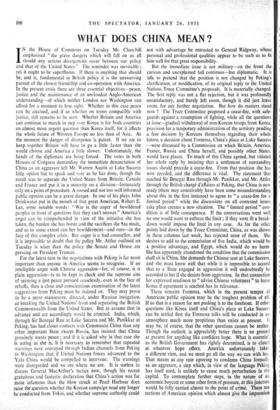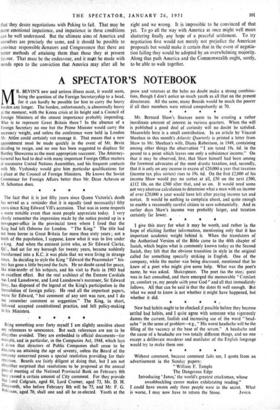WHAT DOES CHINA MEAN ?
IN the House of Commons on Tuesday Mr. Churchill emphasised " the grave dangers which will fall on us all should any serious divergencies occur between our policy and that of the United States." The reminder was inevitable ; yet it ought to be superfluous. If there is anything that should be. and is, fundamental in British policy it is the unswerving pursuit of the closest friendship and co-operation with America. In the present crisis there are three essential objectives—peace, justice and the maintenance of an unclouded Anglo-American understanding—of which neither London nor Washington can afford for a moment to lose sight. Whether in this case peace can be attained, and if so whether on terms compatible with justice, still remains to be seen. Whether Britain and America can continue to march in step over Korea is for both countries an almost more urgent question than Korea itself, for it affects the whole future of Western Europe no less than of Asia. At the moment the danger of divergence is patent. If we are to keep together Britain will have to go a little faster than she would choose and America a little slower. Unfortunately, the hands of the diplomats are being forced. The votes in both Houses of Congress demanding the immediate denunciation of China as an aggressor left Mr. Warren Austin at Lake Success little option but to speak and vote as he has done, though the result was to separate the United States from Britain, Canada and France and put it in a minority on a division—fortunately only on a point of procedure. A roused and not too well informed public opinion can be a grave danger. In one of his plays John Drinkwater put in the mouth of that great American, Robert E.
Lee, some notable words: " War is the anger of bewildered peoples in front of questions that they can't answer." America's anger can be comprehended in view of the initiative she has taken, the burden she has borne and the-sacrifices she has made. and so to some extent can her bewilderment—and ours—in the face of this complex crisis. But anger is a bad counsellor, and it is impossible to doubt that the policy Mr. Attlee outlined on Tuesday is wiser than the policy the Senate and House are pressing on President Truman.
For the latest turn in the negotiations with Peking is far more important than anyone in America seems to recognise. If an intelligible anger with Chinese aggression—for, of course, it is plain aggression—is to be kept in check and the supreme aim of securing a just peace pursued ceaselessly, even in the face of rebuffs, then a close and conscientious examination of the latest suggestions from Peking must be insisted on. They may prove to be a mere manoeuvre, directed, under Russian instigation, at breaking the United Nations' front and separating the British Commonwealth from the United States. But to assume that in advance and act accordingly would be criminal. India. which, through Sir Benegal Rau at Lake Success and Mr. Panikkar at Peking, has had closer contacts with Communist China than any other important State except Russia, has insisted that China genuinely wants peace ; and if it is asked why in that case she is acting as she is, it is necessary to remember that repeated warnings were conveyed through Indian channels from Peking to Washington that if United Nations forces advanced to the Yalu China would be compelled to intervene. The warnings were disregarded and we are where we are. It is useless to discuss General MacArthur's tactics now, though his recent gratuitous and fantastic declaration that China's action was far more infamous than the blow struck at Pearl Harbour does raise the question whether the Korean campaign need any longer be conducted from Tokio, and whether supreme authority could not with advantage be entrusted to General Ridgway, whose personal and professional qualities appear to be such as to fit him well for that great responsibility.
But the immediate issue is not military—on the front the curious and unexplained lull continues—but diplomatic. It is idle to pretend that the position is not changed by Peking's clarification, or modification, of its original reply to the United Nations Truce Committee's proposals. It is materially changed.
The first reply was not a flat rejection, but it was profoundly unsatisfactory, and barely left room, though it did just leave room, for any further negotiation. But how do matters stand now ? The Truce Committee proposed a cease-fire, with safe- guards against a resumption of fighting, while all the questions at issue—gradual withdrawal of non-Korean troops from Korea, provision for a temporary administration of the territory pending a free decision by Koreans themselves regarding their whole future, a decision about Formosa, China's place at Lake Success —were discussed by a Commission on which Britain, America. France, Russia and China herself, and possibly other States, would have places. To much of this China agreed, but vitiated her whole reply by insisting that a settlement of outstanding issues should precede .a cease-fire. From that position she has now receded, and the difference is vital. The statement that reached Sir Benegal Rau through-Mr. Panikkar, and Mr. Attlee through the British chargé d'affaires at Peking, that China is now ready (there may conceivably have been some misunderstanding about this in the first instance) to agree to " a cease-fire for a limited period " while the discussions on all contested issues take place creates a new situation. The " limited period " con- dition is of little consequence. If the conversations went well no one would want to enforce the limit ; if they went ill a break- down would impose the limit in any case. As for the other points laid down by the Truce Committee. China, as was shown in these columns last week, has rejected none of them. She desires to add to the commission of five India, which would be a positive advantage, and Egypt, which would do no harm. She has apparently abandoned the condition that the commission shall sit in China. She demands the Chinese seat at Lake Success, and she must know well that while it is impossible to accord that to a State engaged in aggression it will undoubtedly be accorded to her if she desists from aggression. In that connection her expressed readiness to " advise Chinese volunteers " to leave Korea if agreement is reached has its relevance.
There remains Formosa. which in the present temper of American public opinion may be the toughest problem of all. If so that is a reason for not pushing it to the forefront. If other questions like Korea itself and China's place at Lake Success can be settled first the Formosa talks will be conducted in an atmosphere much more propitious than exists at present.
may be, of course, that the other questions cannot be settled. Though the outlook is appreciably better there is no ground at present for anything like confident hope. What is essentia', as the British Government has rightly determined, is to clutch at whatever hope offers. America unfortunately lakes a different view, and we must go all the way we can with het. That means at any rate agreeing to condemn China formally as an aggressor, a step which, in view of the language Peking has itself used, is unlikely to cause much perturbation in the capital. To contemplate further steps, in the nature of an economic boycott or some other form of pressure, at this juncture would be folly carried almost to the point of crime. There are sections of American opinion which almost give the impression that they desire negotiations with Peking to fail. That may be mere emotional impatience, and impatience in these conditions can be well understood. But the ultimate aims of America and ourselves are precisely the same, and it should be possible to convince responsible Senators and Congressmen that there are better methods of attaining them than those they at present favour. That must be the endeavour, and it mist be made with minds open to the conviction that America may after all be right and we wrong. It is impossible to be convinced of that yet. To go all the way with America at once might well mean shattering finally any hope of a peaceful settlement. To try negotiation first would not merely not prejudice the American proposals but would make it certain that in the event of negotia- tion failing they would be adopted by an overwhelming majority. Along that path America and the Commonwealth ought, surely, to be able to walk together.







































 Previous page
Previous page